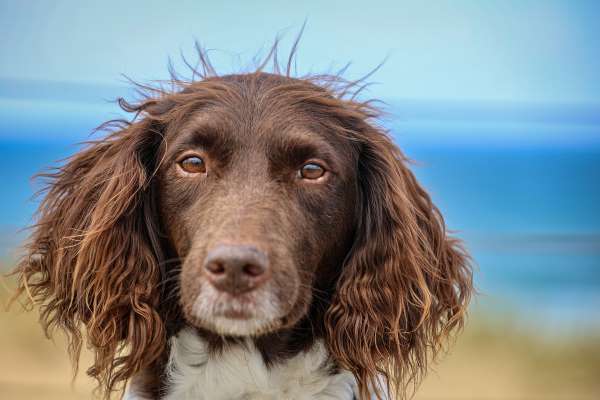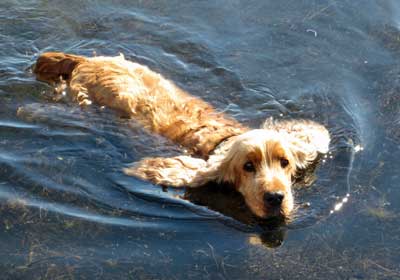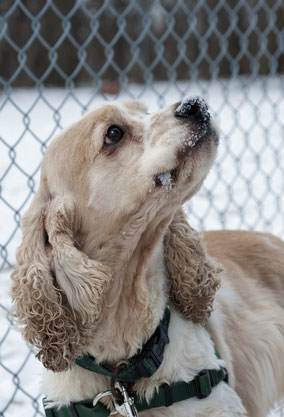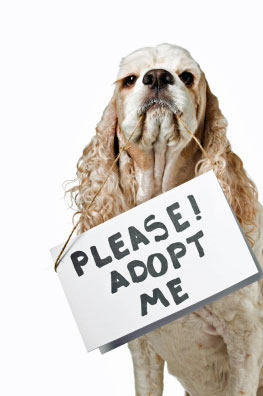- Home
- Getting A New Puppy
- Adopting a cocker spaniel
Adopting A Cocker Spaniel - Pros and Cons?
There are many advantages to adopting a cocker spaniel rather than buying a puppy. We all agree that puppies are adorable, so it's no wonder that once you've made the decision to get a dog, your first thought is to get a puppy. However, an adult Cocker Spaniel has much to offer, especially in terms of love and affection. In fact, there are many advantages of adopting an older dog.
Adopting A Cocker Spaniel Means Trouble, Doesn't It?
I'm often asked for advice on adopting a Cocker Spaniel, so I'm writing about it here.
(The original question that prompted this article and my reply can be found here.)
Adopting an older dog doesn't necessarily mean that you're getting a dog with 'extra baggage', but unfortunately, there is a common but mistaken belief that dogs end up in a rescue centre because of behavioural problems.
 How could you resist adopting a Cocker Spaniel as cute as me?
How could you resist adopting a Cocker Spaniel as cute as me?Some do, but there are many circumstances where dog owners are reluctantly forced to give their beloved dogs to a rehoming centre.
There are many good reasons for this, some of which are explained below.
Why Older Dogs Sometimes End Up In Rescue Centres
There are many reasons adult cocker spaniels could end up in a rescue centre, and they're not all the dog's fault.
If you plan on adopting a Cocker Spaniel, it's a good idea to ask the rescue centre why the dog was submitted for rehoming.
Knowing how long he's been in the centre would also be helpful.
For example, if the previous owner was elderly and has sadly passed away, you can rest assured that the dog probably wasn't submitted for rehoming because of behavioural issues.
The dog will likely have been well-socialized, fully house-trained, with no, or very few, problems.
 This gorgeous cocker spaniel is modelling her new winter coat - isn't she cute?
This gorgeous cocker spaniel is modelling her new winter coat - isn't she cute?Another plausible reason for being in the rescue centre would be that the family had moved abroad but couldn't take their pet.
The staff should give you a short history and be able to confirm whether the dog is well-trained, whether he's housebroken, and whether he has any unusual behavioural traits.
Unfortunately, if the dog arrived as a stray, the centre won't know much about the dog's background. They will, however, be able to assess the dog's health and temperament.
If the rescue dog has been with many different owners and is up for adoption once again, you may find that the dog has some behavioural problems.
In this case, you need to find out more and consider whether or not you could manage such a dog. Alternatively, you could ask the rescue centre for help finding an animal behaviourist or dog trainer, depending on the severity of the problem.
You may find that all the dog needs are firm guidance, lots of loving and plenty of cuddles.
Read more reasons why dogs end up in rescue centres to understand that not all rescue dogs are problem dogs.
The Benefits of Adopting A Cocker Spaniel
There are many benefits attached to adopting a cocker spaniel dog rather than a puppy, including:
- An adult cocker spaniel from a rescue home will be fully vaccinated, perhaps even microchipped.
- Your adult cocker spaniel will be fully grown, so what you see is what you get in terms of size, colouring, and temperament. With a puppy, he's not the finished article, and his appearance is likely to change over time.
- An older dog arrives 'ready trained' and is more likely to know how to behave well in our human world. The dog will have already been socialized and be used to handling many different situations.
He will be confident around people (including children) and other dogs. The dog will also be familiar with loud noises and many other stressful situations. - They've been through the 'puppy stages', so you will avoid the stresses (yours!) of the puppy biting and chewing stage, meaning your new slippers will be safe!
- Older dogs are more likely to be housetrained. Need I say more?
- Adult Cocker Spaniels are more sedate and quieter than young puppies. They don't need as much exercise as they grow older, but they will still enjoy a stroll in the park and a few short walks.
- For some senior or more mature owners, a puppy may prove too much to handle. Adopting an adult cocker spaniel would be an ideal option for those owners.
- An 0lder rescue dog tends to be more loving and more likely to develop a strong bond with its new owner. Perhaps this is because they crave the security and love of a forever home and appreciate the love you offer them.
Potential Negative Points of Adopting A Cocker Spaniel
If you're adopting a Cocker Spaniel and it turns out that he has some bad habits, it could take a bit of time re-train him; however, it will be possible.
 Adopting a Cocker Spaniel keeps dogs like me out of rescue centres!
Adopting a Cocker Spaniel keeps dogs like me out of rescue centres!Annoying habits such as; peeing or pooping in the house, excessive barking, digging holes in your prized flower bed, or resource-guarding, can be very stressful and often difficult to remedy without resorting to a qualified animal behaviourist or dog trainer.
The dog may be so traumatized that he no longer trusts humans, and, as a result, he may become unfriendly, even aggressive.
The dog may not have been socialized enough as a puppy and is either aggressive or scared of his own shadow.
When adopting a Cocker Spaniel adult dog, there are likely to be more trips to the vet because, as your dog's years increase, so do the vet bills.
The reason for this is that an older dog, at some point, may develop, for example, arthritis, diabetes, or pancreatitis, which will need the care and attention of a vet more frequently.
However, we should recognize that you will eventually have these costs when your puppy finally reaches his senior years.
BEFORE Adopting A Cocker Spaniel...
Before adopting a Cocker Spaniel, it's a good idea to stop and give a little consideration to what will work best for you, for example:
- What size dog will better suit your needs?
- Would you prefer a male or a female dog, or doesn't it matter to you?
- Are there any other dogs/pets in your home that you need to consider?
- Can you handle a dog that barks quite a lot? Would it bother you or your neighbours? Would you know how to teach your new dog to stop barking excessively? If you don't want a dog that barks a lot, put that on your list of questions to ask the rescue centre.
- How much time do you have to devote to your dog?
- Do you have any physical limitations? Are you fit enough to take care of an adult cocker spaniel?
- And last but not least, can you afford to take on all the costs associated with a dog?
On top of everything you'll need to buy for your dog, the fees for adopting a cocker spaniel can be very high. Make sure you understand all the costs involved.
 My new mummy loves me!
My new mummy loves me!How Might Your Rescue Dog Be Feeling?
When adopting an older dog, once you've got him home, take a moment to consider things from his point of view, for example:
- Your newly adopted dog will suddenly find himself in a strange and unfamiliar environment, and he might feel quite nervous or even scared.
- For the first few days, he may miss his previous owner and other family members.
- He may have had a traumatic time before he arrived at the centre.
Situations like those above will create stress and anxiety for the dog, so we should be aware of them and try to help him settle in quickly and without stress.
When Adopting A Cocker Spaniel, Preparation Is Key
Prepare the house for when you bring your cocker spaniel home:
- Decide on where you'd like him to sleep and place his bed there;
- Set out his food and water bowl (away from the bed);
- Decide where you prefer him to do his toilet in your yard or garden;
- Make sure your home is fully dog-proofed; if you're unsure, you can take a peek here for ideas;
- Ensure you've got the basics, such as food, a lead and collar, a small selection of toys, a bed or a crate (if you're going to crate him) and an identity tag.
Ask the rescue centre what type of food he's currently on and buy the same so he doesn't get an upset tummy; - It's best to register with a vet before you bring him home so that if you have an emergency, for whatever reason, you'll be able to jump into action and not run around like a headless chicken!
Helping Your Adopted Cocker Spaniel Settle In
We can remove some of this stress by keeping the house quiet and bonding with him as quickly as possible.
You can do many things BEFORE you collect your adopted dog to ensure things go smoothly and help him settle in quickly when you bring him home.
Keep His First Few Days Quiet And Calm
There are a few things you can do to help him get used to his new home and family:
- Keep the house quiet and calm, and let him settle in gently.
- Introduce him to his food and water bowls (he may be thirsty or hungry). Let him wander around, sniffing where he pleases, and allow him to get used to his new home.
- Show him his new bed and his crate if he has one. (If he cries during the night, you might like to let him sleep in your bedroom (in his bed) for the first few nights, but try to get him used to sleeping in his own area as soon as possible).
- Show him the spot in the garden you've chosen for his toilet and encourage him to do his business (use whatever words you prefer). Take him to his toilet area every hour or so for the first few days; it won't be long before he understands what you want from him.
- Take him for a short walk around the neighbourhood to help him get his bearings and perhaps meet some of the local dogs, but don't go out of your way to do the latter, not just yet.
- When you're back home, let him settle down beside you for a while and sit with him. Stroke him and talk to him quietly to help relax and reassure him. It will also help you bond more quickly.
- If you have children, try to stop them from getting too excited (I know, it's easier said than done!), but ask them to be gentle with him. Give them some ground rules.
If all goes well, you should see your new Cocker Spaniel settled in nicely by the end of his first week.
 The water is lovely and cool mum!
The water is lovely and cool mum!Tips on Caring for an Older Dog
A Cocker spaniel's lifespan is between ten and thirteen years, but many dogs live much longer (my Cocker is now 14 years old and (almost) still going strong).
In the doggie world, if you're seven or eight years old, you're considered a senior dog!
As our Cocker Spaniels age, they will gradually begin to have health problems, usually with their sight and hearing. However, an older dog may face other health problems, so it's a good idea that you make regular trips to the vet. I recommend a minimum of twice a year.
Giving your ageing Cocker a few short walks rather than one long one is better. Keep a watchful eye out for stiffness in his legs or joints or a reluctance to walk or climb stairs (often a sign of joint pain).
If you think your dog may have pain caused by movement, your vet will prescribe something to ease his stiffness or pain.
An ageing dog is also less likely to need the same amount of food to fuel his ageing body (although they will still hound you whenever you wander into the kitchen!).
Cocker Spaniels are known for their tendency to become 'chubby' in their older years. As their lifestyle begins to slow, they don't need the calories they are used to having, and also, because the dog is exercising less, they pile on the pounds, which is why changing an older dog's diet is advisable.
Many dog food manufacturers cater for senior dogs with kibble that is low in fat and less protein but with all the nutrients for the older dog.
Summary: Adopting A Cocker Spaniel
Many senior dogs may suddenly find themselves confused and alone in a rescue centre in their latter years, usually through no fault of their own.
To make it worse, they often get bypassed in favour of a younger dog or a puppy.
However, there are many benefits of adopting a cocker spaniel from a rescue centre, and you'll be giving an older dog a chance to enjoy his golden years in a happy, warm and loving environment.
Please consider adopting a Cocker Spaniel rather than buying a puppy.
He will love you all the more for having rescued him from an unhappy end to his years. The love and bond that passes between a rescue dog and his rescuer are strong and very special.
So go ahead, add some happiness and sunshine to an adult cocker spaniel's life.
There may be one waiting just for you!
Photo Credits for Adopting a Cocker Spaniel:
1. Stefan Andronache at https://stock.adobe.com/fr/images/cocker-spaniel/41006831
2. Precious - Visitor Photo
3. Misu at https://stock.adobe.com/fr/images/american-cocker-spaniel/47819025
4. Ma_Frank at https://pixabay.com/photos/dog-domestic-animal-portrait-7311407/
5. Owners Cocker Spaniel





